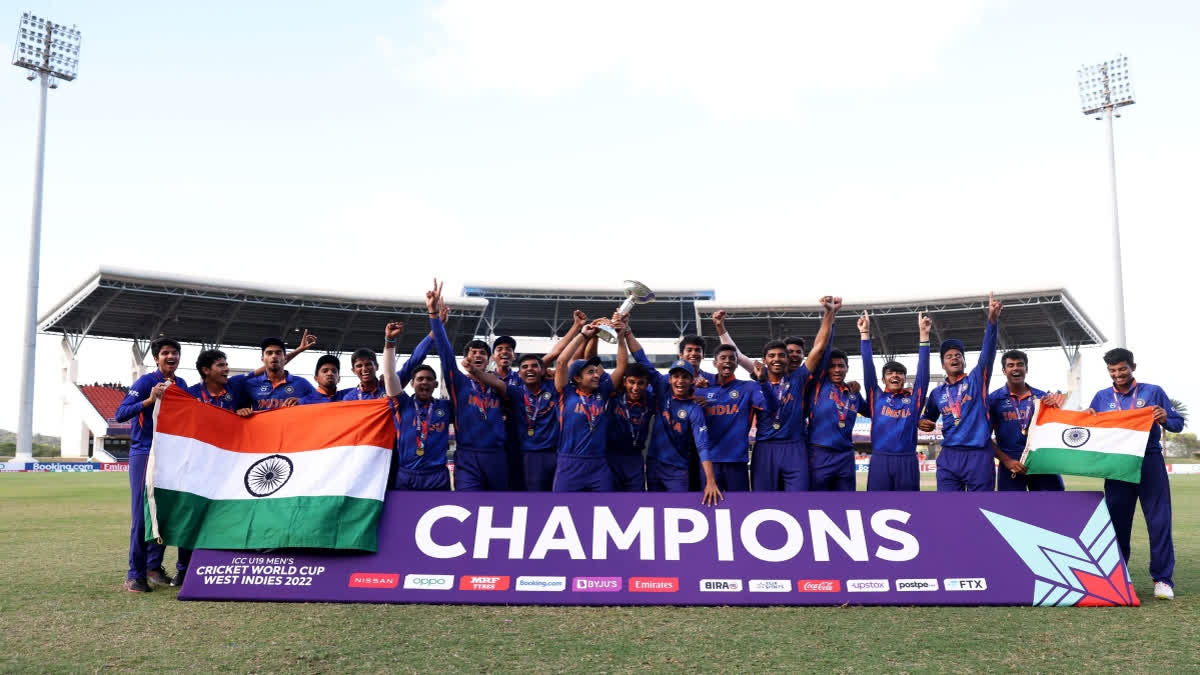Bloemfontein (South Africa): Many dreams will take flight and futures will be shaped when the Under-19 World Cup begins here on Friday with rival teams looking to halt dominance of record five time champions India. The legacy of the Under-19 World Cup as a breeding ground for future cricketing stars is well established.
The tournament has unearthed a bevy of Indian stars -- Yuvraj Singh in 2000, Rohit Sharma in 2006, Virat Kohli and Ravindra Jadeja in 2008, Rishabh Pant and Ishan Kishan in 2016, Shubman Gill in 2018 -- to name a few.
At the world level also, the tournament has produced players who went on to become legends of the game. But at the same time, there have been many who have not been able to replicate the immense promise shown at the age group and they include the likes of Ravikant Shukla, Manish Pandey, Unmukt Chand, Yash Dhull, Manjot Kalra and Kamlesh Nagarkotti.
All eyes again would be on India, who will be led by Punjab's Uday Saharan. They begin their campaign against neighbours Bangladesh in Group A on Saturday. Group A also features the USA and Ireland who will set the ball rolling in the opening match of the tournament that will run till February 11 with the summit clash in Benoni. Sixteeen teams are divided into four groups with top three making the Super Sixes where 12 teams will be divided into two pools. The top-two will then make the semi-finals, also slated in Benoni on February 6 and 8.
India this time did not have a proper build-up and have arrived here after a series of National Cricket Academy camps and just two tournaments -- the Asia Cup and the recently concluded Tri-series in South Africa. The journey has been marked by setbacks, including a semi-final exit at the Asia Cup, where the Saharan-led side lost to hosts and eventual champions Bangladesh by four wickets. But the team's trajectory has seen a significant upswing since then, culminating in an unbeaten run to clinch the Tri-series in South Africa where Afghanistan were the third team.
The honours were shared by India and South Africa after a wash-out in the final earlier this month. It remains to be seen if they're able to maintain their stranglehold on the coveted U-19 ODI trophy without extensive preparation. Australia are the next most successful side in the tournament with three titles in 1988, 2002, and 2010, while Pakistan secured the title in 2004 and 2006. Bangladesh (2020), South Africa (2014), West Indies (2016), and England (1998) have won the event once.
Part of India's squad is Arshin Kulkarni, who one of only two players in the team to be signed at the IPL auction. A find of the Maharashtra Premier League, Arshin hit maximum sixes (19) to outshine the seniors like Ruturaj Gaikwad, Kedar Jadhav and Rahul Tripathi.
Chennai Super Kings recruit Aravelly Avanish caught attention with a remarkable 163 off 93 balls at the quadrangular series in November. He later impressed in the Vinoo Mankad Trophy as well. Musheer Khan, player of the tournament in Cooch Behar Trophy last year, and skipper Saharan, who has shifted base to Bhatinda in Punjab from Rajasthan, will also have significant roles to play.
Skipper Saharan is also in the midst of a fine run in the Tri-series with scores of 112, 74 and 50 not out in his last three innings. Raj Limbani raised eyebrows by taking 7/13 (9.1) against Nepal, while vice-captain Saumy Pandey impressed with 6/29 against Afghanistan.
In other teams, the players to watch out for are New Zealand's Rahman Hekmat, who idolises Shane Warne and Rashid Khan, Pakistan rising pacer Ubaid Shah, Afghan off-spinner Allah Mohammad Ghazanfar and England's Luc Benkenstein. Hosts South Africa will begin their campaign taking on the West Indies in Group B where they will also find formidable opposition in England and Scotland. Australia will be challenged by Sri Lanka and African teams Zimbabwe and Namibia for the top spot in Group C.
The second-most successful team of the tournament are coming on the back of a successful tour of England in late 2023. In Group D, it seems to be a three-way fight among Pakistan, Afghanistan and New Zealand for the two available spots for the Super Sixes.
The Groups
Group A: Bangladesh, India, Ireland, USA
Group B: England, Scotland, South Africa, West Indies
Group C: Australia, Namibia, Sri Lanka, Zimbabwe
Group D: Afghanistan, Nepal, New Zealand, Pakistan.
Read More



